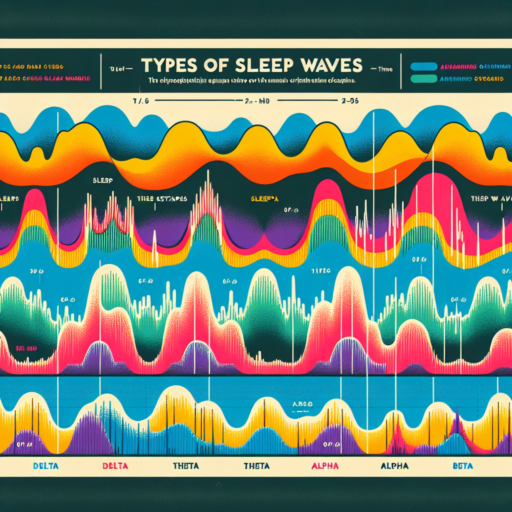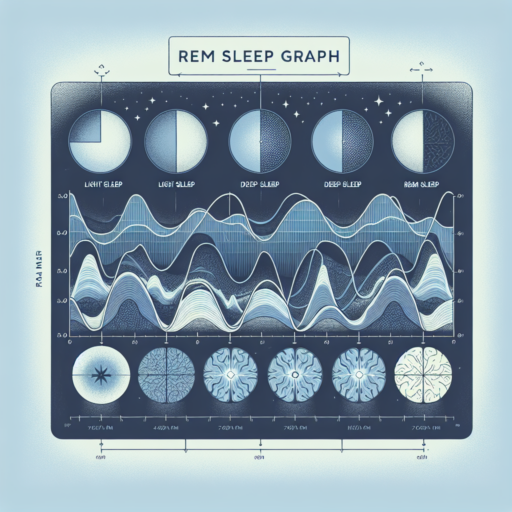Understanding Sleep Cycles and The Role of Sleep Waves
Delving into the essence of sleep reveals a complex process that is both fascinating and vital for our physical and mental well-being. At the heart of this process are sleep cycles and sleep waves, components that play a critical role in determining the quality of our rest. Through understanding these elements, we unlock the secrets to unlocking improved health and wellbeing.
Sleep cycles consist of several stages, each characterized by specific brain wave activities. These stages cycle through approximately every 90 to 110 minutes during a typical night’s sleep. Inspecting the structure of these cycles reveals a pattern starting with light sleep, progressing into deep (slow-wave) sleep, and often culminating in rapid eye movement (REM) sleep. The role of sleep waves, such as alpha, beta, delta, and theta waves, is paramount in transitioning through these stages. Each wave signifies a different depth of sleep, influencing everything from memory consolidation to physical recovery.
The Significance of Each Sleep Stage
- Light Sleep: This initial stage acts as a gateway into deeper sleep levels, involving a slowdown in heart rate and a decrease in body temperature.
- Deep Sleep: Deep or slow-wave sleep is critical for physical recovery, growth, and immune function. During this phase, delta waves reign supreme, facilitating restoration and energy replenishment.
- REM Sleep: Marked by rapid eye movement and vivid dreams, this stage is essential for emotional regulation and memory consolidation. Here, the brain becomes more active, mirroring wakefulness in many ways.
Understanding the intricate dance between sleep cycles and sleep waves not only fascinates from a scientific standpoint but also offers actionable insight into enhancing one’s sleep quality. By recognizing the characteristics and importance of each stage and wave, individuals can adopt practices that align with the natural rhythm of their sleep, leading to more restorative and rejuvenating rest periods.
Different Types of Sleep Waves Explained
Understanding the various types of sleep waves is key to appreciating how our brain cycles through different stages of sleep. These stages are marked by distinct patterns of brain waves, each associated with specific states of sleep. From the light slumber to the deep, restorative stages, the brain’s activity levels fluctuate, illustrating a complex process that is crucial for our overall well-being and cognitive functions.
Alpha Waves: The Gateway to Sleep
As we begin our journey into sleep, our brains produce Alpha Waves. Typically associated with calm, wakeful states such as meditation, alpha waves serve as a bridge between wakefulness and the first stage of sleep. With a frequency range of 8-13 Hz, these waves indicate a relaxed mental state, preparing us for deeper sleep stages.
Theta Waves: The Light Sleep Stage
Once we drift past the initial stage, Theta Waves dominate our brain activity. This stage is characterized by slower frequency waves, ranging from 4 to 8 Hz, marking the onset of light sleep. During this phase, our bodies begin to relax further, heart rates slow, and temperatures drop, setting the stage for deeper sleep.
Delta Waves: The Deep Sleep Phase
Entering the realm of deep sleep, our brains emit Delta Waves. These are the slowest, with frequencies of 0.5 to 3 Hz, and they signify the most restorative and rejuvenating stage of sleep. It’s during this phase that the body repairs itself, consolidates memory, and releases growth hormones. The presence of delta waves indicates a disconnection from sensory surroundings, providing the deep rest that our bodies and minds require.
Alpha Waves: The Bridge Between Wakefulness and Sleep
Alpha waves play a pivotal role in the transition from our wakeful state to the realm of sleep, acting as a unique neurological bridge. Generated in the brain, these oscillations are most prominent when we are relaxed yet still alert, marking the threshold between consciousness and slumber. Understanding the function and importance of alpha waves not only opens up insights into our sleep patterns but also underscores their influence on our overall well-being and cognitive performance.
At a frequency range of 8 to 12 Hz, alpha waves are primarily observed in the occipital lobe during periods of relaxation with closed eyes. Interestingly, their presence is not solely confined to pre-sleep phases. Meditation, daydreaming, and even brief moments of rest can elicit this same brainwave activity, showcasing the versatility and significance of alpha waves in facilitating mental repose. This neural activity signifies the brain’s readiness for sleep, preparing the mental landscape for the transition to the deeper stages of restorative sleep.
Engagement in activities that promote alpha wave production can be beneficial for stress reduction and enhancing focus. Techniques such as mindfulness meditation, deep breathing, and even engaging in creative hobbies like drawing or musical instruments are known to increase alpha wave activity. Consequently, by fostering an environment conducive to the genesis of alpha waves, individuals can effectively bridge the gap between wakefulness and sleep, improving both the quality of rest and cognitive alertness during waking hours.
Theta Waves: Deep Relaxation and the First Stage of Sleep
Theta waves play a pivotal role in ushering the human mind into a state of deep relaxation, marking the transition towards the first stage of sleep. Characterized by their low frequency, these brain waves are fundamental in the processes that facilitate both mental and physical relaxation, setting the stage for a restful night’s sleep. As we dive deeper into understanding theta waves, we uncover their significant impact on our well-being and their capacity to enhance the quality of our rest.
During the day, our brains are predominantly in a state of higher frequency waves such as beta waves, which are associated with active thinking and alertness. However, as we begin to unwind and prepare for sleep, our brain activity shifts towards the slower, more meditative theta waves. This transition is not just crucial for falling asleep but also plays a vital role in the quality of sleep we experience. The presence of theta wave activity is often associated with improved sleep quality, aiding in the overall restorative process of sleep.
Understanding the significance of theta waves can provide insights into techniques and practices that promote better sleep hygiene. Meditation, relaxation techniques, and mindful breathing exercises are known to encourage the production of theta waves, thereby facilitating the body’s natural progression into sleep. By incorporating practices that augment theta wave activity into our nightly routine, we can potentially improve our ability to fall asleep more quickly and enjoy a more restful, undisturbed sleep.
No se han encontrado productos.
Delta Waves: Deep Sleep and Its Importance
Delta waves, the slowest and highest-amplitude brain waves, play a crucial role in our sleep cycle, particularly during the deep sleep stage. This stage of sleep is essential for many of the body’s repair processes, and the presence of delta waves indicates that these vital functions are being carried out. Understanding the significance of delta waves can offer valuable insights into how we can improve our overall health and well-being by prioritizing deep sleep.
During deep sleep, delta waves help in the healing and regenerative processes, reducing inflammation and supporting the immune system. This is when the brain and body have the chance to recover from the day’s activities, consolidating memories, and processing information. It’s a period of physical and mental restoration that prepares us for the next day, making deep sleep crucial for cognitive functions and emotional health.
Unfortunately, many lifestyle factors can disrupt the production of delta waves, leading to insufficient deep sleep and its associated health benefits. Factors such as stress, excessive screen time before bed, and irregular sleep patterns can all hinder the body’s ability to enter this restorative phase. By addressing these disruptors and fostering habits that promote delta wave production, individuals can improve their deep sleep quality and, by extension, their overall health.
REM Sleep: Understanding its Unique Wave Patterns
REM sleep, an acronym for Rapid Eye Movement sleep, distinguishes itself from other sleep phases through its unique wave patterns. This stage of sleep is critical for cognitive functions such as memory processing and emotional regulation. Unlike the slow wave activity observed in non-REM sleep stages, REM sleep is characterized by brain activity that mirrors wakefulness, making its wave patterns a fascinating subject of study.
During REM sleep, the brain exhibits high-frequency waves similar to those observed when a person is awake. This paradoxical state results in a unique physiological and neurological environment where vivid dreaming occurs. Researchers have pinpointed that during REM sleep, the brain’s electrical activity, as measured by electroencephalogram (EEG), showcases low amplitude mixed frequency patterns. These patterns indicate an active brain in what is ostensibly a resting body, a phenomenon that has intrigued scientists for decades.
The differences in wave patterns between non-REM and REM sleep are not just academic observations; they have profound implications for understanding human behavior and health. In REM sleep, the brain’s wave patterns suggest a level of activity that supports the processing and consolidation of memories, a process deemed crucial for learning and emotional well-being. It’s during this phase that the brain sorts and processes the day’s emotional experiences, integrating new information with existing knowledge, and reinforcing neural connections.
How Sleep Waves Affect Your Health and Well-being
The influence of sleep waves on our health and well-being is a subject of increasing interest and research within the scientific community. Sleep is not just a time of rest, but a complex process that involves various stages, each characterized by different types of brain waves. Understanding these waves and their impact on our overall health is crucial for optimizing our sleep patterns and enhancing our well-being.
The Role of Different Sleep Waves
When we sleep, our brain transitions through several stages, each dominated by specific sleep waves such as alpha, beta, and delta waves. These stages include light sleep, deep sleep, and REM (Rapid Eye Movement) sleep. Deep sleep, spearheaded by delta waves, is particularly vital for physical renewal, hormonal regulation, and growth. Conversely, REM sleep, which is characterized by a mixture of alpha and beta waves, plays a key role in emotional regulation, memory consolidation, and brain detoxification. Each of these phases contributes uniquely to our health, revealing the intricate link between the quality of sleep waves and our physical and mental health.
Impact on Health and Well-being
The presence and quality of certain sleep waves can have profound impacts on our well-being. For instance, inadequate deep sleep can lead to decreased immune function, increased anxiety, and a higher risk of chronic illnesses such as obesity and heart disease. On the other hand, a lack of REM sleep can impair cognitive functions, memory, and emotional stability. Therefore, achieving a balanced sleep cycle, which includes adequate durations of both deep and REM sleep, is essential for maintaining optimal health and well-being. Furthermore, the quality of these sleep stages can influence everything from mood regulation to our ability to learn and form new memories.
Tips to Improve Your Sleep Quality Through Understanding Sleep Waves
Understanding the different stages of sleep and how they affect your sleep quality is crucial for anyone looking to improve their nighttime rest. Sleep waves, or brainwaves, play a significant role in cycling through the various sleep stages. By learning how these waves work and what you can do to influence them, you can take meaningful steps towards enhancing your sleep quality.
Recognize the Patterns of Your Sleep Cycle
Firstly, it’s important to acknowledge the patterns of your sleep cycle. Typically, a sleep cycle includes stages of light sleep, deep sleep, and REM sleep. Deep sleep is particularly critical as it’s when your body undergoes most of its recovery and repair work. Paying attention to the length and quality of your deep sleep can provide insights into how well-rested you’ll feel.
Implement a Consistent Sleep Schedule
Maintaining a consistent sleep schedule enhances your sleep quality by aligning your body’s internal clock with your sleep patterns. Going to bed and waking up at the same times every day, even on weekends, helps regulate your sleep waves and promote a smoother transition between the sleep stages. This consistency reduces sleep latency, the time it takes to fall asleep, and can increase the duration of deep sleep.
Optimize Your Sleep Environment
Finally, optimizing your sleep environment can have a profound impact on the quality of your sleep waves. Factors such as room temperature, noise, and light levels all influence your body’s ability to cycle through sleep stages efficiently. Ensuring that your bedroom is quiet, dark, and cool can help your brain to enter and sustain deep sleep stages more easily, leading to a more restorative night’s rest.
The Future of Sleep Research: What’s Next for Sleep Waves?
As the world of science progresses, the future of sleep research, particularly concerning sleep waves, is poised at an exciting juncture. Understanding how sleep waves, such as REM and non-REM cycles, function and affect our cognitive abilities, emotional resilience, and overall health is at the forefront of modern scientific inquiries. This field’s potential breakthroughs could revolutionize the way we perceive and manage sleep, making it a central topic of interest among researchers and the public alike.
Advancements in Technology and Sleep Wave Analysis
The advent of more sophisticated technology is a beacon of hope in untangling the complex nature of sleep waves. Non-invasive methods for monitoring brain activity are becoming increasingly refined, enabling more precise analysis of sleep patterns without disrupting the natural sleep cycle. The integration of artificial intelligence to interpret vast amounts of data could lead to personalized sleep interventions, making improved rest within reach for more people.
The Potential for Personalized Sleep Medicine
With every discovery made in the realm of sleep waves, we inch closer to the era of personalized sleep medicine. Understanding individual variances in sleep patterns and how they correlate with physical and mental health issues can lead to tailored treatments. The goal is not just to address insomnia or other sleep disorders but to optimize sleep for enhanced daily performance and long-term well-being. Future research might focus on how altering sleep waves could treat and possibly prevent certain illnesses.
Certainly, focusing on enhancing the SEO aspect through targeted information under the provided H2:
FAQs: Common Questions About Sleep Waves Answered
Sleep waves, or brain waves during sleep, play a crucial role in how well we rest. Understanding them can unlock the door to improving sleep quality. Here, we address the most common queries about sleep waves.
What Are the Different Types of Sleep Waves?
The brain produces several types of waves during sleep, each associated with a specific stage of sleep. These include Alpha, Beta, Theta, Delta, and Gamma waves. Delta waves, for example, are predominant in deep sleep, while Alpha waves are linked with light relaxation.
How Can Sleep Waves Affect Your Health?
Sleep waves have a profound impact on our overall health. For instance, adequate Delta wave sleep is essential for physical recovery, whereas deficiencies in certain sleep wave patterns can lead to sleep disorders. Improving the quality of these waves can bolster our mental, physical, and emotional health.
Can You Influence Your Sleep Waves?
Yes, various practices can influence the nature of your sleep waves, including meditation, relaxation exercises, and adhering to a consistent sleep schedule. These activities promote healthier sleep wave patterns, leading to more restorative sleep.
This structured approach provides a succinct yet informative overview of the topic, catering to common user queries and integrating keywords naturally to support SEO efforts.




